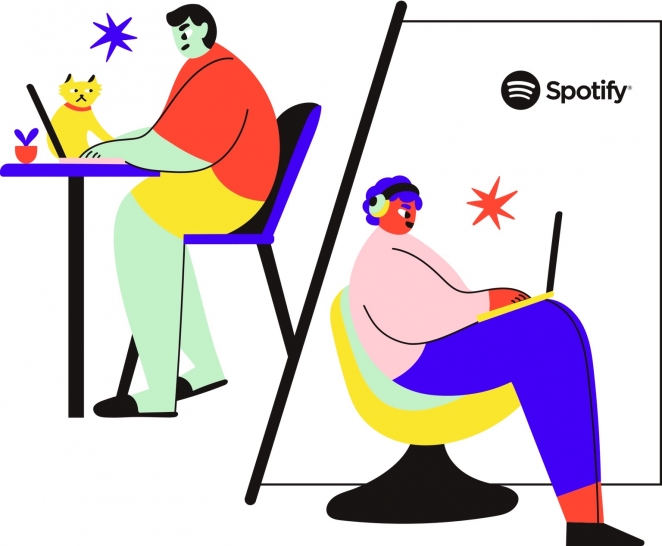Amidst all the heavily unexpected things that happened when 2020 hit, a sudden push for smart and remote working was certainly one of the most prominent. Overnight, hordes of workers were forced to move from the office to the comfort of their own homes – and despite some sceptics believing this could only bring trouble, productivity remained largely in the same place. In some cases, it even saw a boost.
We found that much in our very own Coronavirus Survey early on last year, and quite frankly, we were sceptical ourselves that all these people could still remain productive from home. But it makes sense, doesn’t it? Apart from the sheer fear of redundancies that kept some parts of the industry going, a lot of us were actually way more comfortable working from home.
So it doesn’t come as a surprise that some brands and big companies out there are choosing to ditch office lifeand move to remote for the foreseeable future. Now though, Spotify is taking that extra step. Spotify is introducing a new Work-From-Anywhere policy – and when they say ‘anywhere,’ they mean literally anywhere.

Credit: Spotify HR Blog
An overview of the new Spotify policy
If you take a look at our Employee Experience Predictions for 2021, you’ll see that we got that one in the bag: the future of work is from anywhere. Embracing remote work opens up endless possibilities for companies looking for talent all across the world, potentially tapping into a global pool of professionals.
Now Spotify has decided to be one of the first companies to actually encourage that change. On the 12th of February, Spotify announced a change to its work policy with its very own Work From Anywhere programme.
In a nutshell, here’s what the post on the HR Spotify blog says:
- Work isn’t something you come to the office for, it’s something you do
- Effectiveness can’t be measured by the number of hours people spend in an office – instead, giving people the freedom to choose where they work will boost effectiveness
- Giving our people more flexibility will support better work-life balance and help tap into new talent pools while keeping our existing band members
- Operating as a distributed organisation will produce better and more efficient ways of working through more intentional use of communication and collaboration practices, processes and tools.
Starting this summer, Spotify will give employees full decisional power over whether they would like to work full time from home, in the office, or a mix of both. The brand will also introduce more flexibility when it comes to the choice of location. Employees will be able to literally work from anywhere they wish to, with few restrictions of countries and cities – within certain limits, of course, and only to “address time zone difficulties.” Which is pretty understandable, all things considered. In short, you may not be able to work from Japan if your main office is in London.
I have to admit, I’m not personally a big fan of Spotify as a brand, for my own reasons which I may or may not discuss in a separate article. But this employee initiative is spot-on, perfectly timed, and something that you would expect from a company as prominent and overtly progressive as Spotify.

Artwork credit: Kishore Ghosh
Building a healthy workplace, one bit of trust at a time
There is one bit in the Spotify official statement that I believe truly captures the spirit of employers believing in a remote workforce: “A flexible working culture is built on trust, communication, collaboration, and connection.”
We know humans don’t like change. But perhaps the main reason why most employers didn’t adopt remote working until 2020 is that they believed employees wouldn’t be as productive from home. This misconception goes beyond just the creative industry. Before 2020, there was a shared misbelief that, if left on their own, employees would not work as well or as much. Obviously, that belief has since been completely debunked.
Even countries where this misconception is deeply rooted in daily culture, like my own motherland, have since realised that. And the reason is easy to guess: a healthy workplace thrives on trust, rather than micro-management and doubts. The best leaders are the ones praising you for your work and encouraging you to always go the extra mile, rather than the ones assuming that “you are being paid, so you are expected to do your job well.”
It may not be something suitable for all employers, but it’s clear now that Spotify’s Work-From-Anywhere policy is the future of work. And it will certainly help the brand attract some of the best talent from all over the world – simply because it cares enough to put trust in its own employees. Like any great employer should (and will) do.






